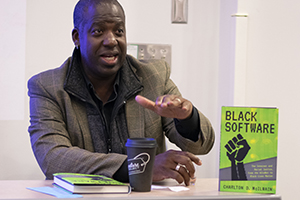Communications
Dr. Charlton McIlwain Proves the Black Community’s Contribution to the Internet and Social Media with “Black Software”

American University welcomed Dr. Charlton Mcllwain, NYU Professor of Media, Culture, and Communication and Vice Provost for Faculty Engagement and Development on Nov. 14 to discuss his latest book “Black Software: The Internet & Racial Justice, from the AfroNet to Black Lives Matter.” Dr. McIllwain’s recently released book addresses the intersections of race, digital media, and racial justice activism. Most importantly, it details an otherwise forgotten history of how Black people’s use of technology helped shape the Internet and created the groundwork for racial justice activism.
The author’s research was inspired by his desire to learn more about the origins of the Black Lives Matter movement. “The Black Lives Matter movement took us by storm,” he said. “Not enough can be said about the positive outcomes of this movement.”
Dr. Mcllwain recalled the moment he realized the importance of educating the black community on the historical record of their digital roots. He was looking into the BLM movement to gain a better understanding of how it was able to spread so quickly. His research led him back through history that began well before the mid-1990s when the Internet became mainstream.
What the author didn’t expect to find during his research was a rich history of African Americans in the 1960s who worked behind the scenes to advance technology, that would later lead to the development of the Internet and social media platforms. This work would later prove to unify the community and give them a voice. He delved into the contributions of African-American pioneers in the field of technology, including Kamal Amir Masiah Al Mansour, William Murrell, and Derrick Brown.
The guest speaker also challenged the narrative known as the “digital divide,” which is the perceived gap between different socio-economic classes. He said that 5.2 million African-Americans owned computers by the 1990s. While this was still a small percentage of the total number of computer owners at this time, it showed the community was engaged with this technology, contrary to popular belief.
The book also pinpoints the limitations placed on African Americans by technology companies, and how the community created new computing tools to create space online for advocacy and solidarity. Dr. McIlwain left the audience to consider the role of technology on racial justice today. He warned that African-Americans should remember that technology and the Internet are like swords: they offer the community unlimited opportunities for engagement and activism, but can also be used as tools of surveillance and suppression—as the research that he unearthed has demonstrated.
The book talk was co-sponsored by the School of Communication, Internet Governance Lab, AU’s chapter of the NAACP, and The Internet Society (ISOC).